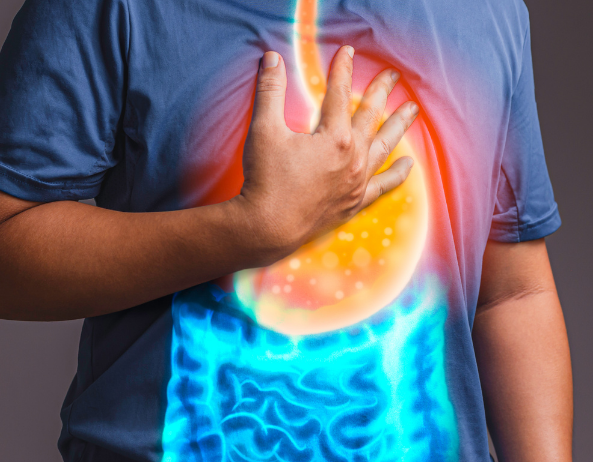Menu
- AyurVAID Pharmacy
Gastroesophageal Reflux Disease (GERD) is a chronic condition affecting the upper gastrointestinal tract, affecting up to 20% of people worldwide. It occurs when the lower esophageal sphincter fails to close, causing stomach contents to backwash to the esophagus. Ayurveda compares GERD to Amlapitta, a digestive disorder with similar symptoms. Agnimandya or impaired digestive function can be cited as the root cause of Amlapitta. AyurVAID’s classical Ayurveda treatment, Panchakarma procedures, diet, and lifestyle modifications aim to restore the proper functioning of the upper and lower gastrointestinal tracts.


AyurVAID uses classical Ayurveda treatment protocols to address the root cause of diseases, aiming for long-term management of GERD. The approach includes in-depth symptom assessment, history taking, and understanding of the patient and disease. AyurVAID’s expert doctors also provide advice on ergonomics, nutrition, and lifestyle changes, focusing on managing trigger factors and improving patients’ quality of life. Patient centricity is at the core of the AyurVAID approach.


Bengaluru – Domlur Bengaluru – Aster CMI, Hebbal Bengaluru – HRBR Layout Bengaluru – Sri Shankara, Basavangudi Bengaluru – Bannerghatta Road Bengaluru – ArekereDelhi – New DelhiKochi – Kadavanthara Uttarakhand-Kalmatia, AlmoraChennai – Greams Road Chennai – Vanagaram Chennai – Kotturpuram Hyderabad – Somajiguda
Ayurveda Parasurgery Autoimmune Disorders Blood Disorders Cardiology Dermatology Endocrinology Ear-Nose Throat-Mouth Elder-Care Gastrointestinal Gynaecology Integrative Oncology Infectious-Diseases Liver-Hepato-Biliary-Care Mental Health and De-addiction Male-Reproductive-Disorders Nephrology Neurological-Disorders Orthopaedic Disorders Ophthalmology Obstetrics-Integrative Preventive-Health-Wellbeing Pulmonology Pediatric-Development-Disorder Sleep-Disorders
Any use of this site constitutes your agreement to the Terms and Conditions, Privacy Policy and Cancellation and Refund Policy
©2025 Apollo AyurVAID Hospitals. All rights reserved.
Popular Searches: DiseasesTreatmentsDoctorsHospitalsWhole person careRefer a patientInsurance